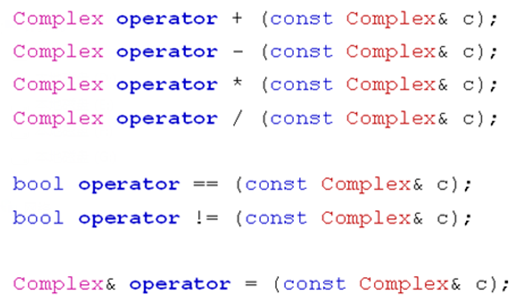这篇文章给大家介绍怎么在C++中重载操作符,内容非常详细,感兴趣的小伙伴们可以参考借鉴,希望对大家能有所帮助。
函数重载
函数重载的本质为相互独立的不同函数
通过函数名和函数参数来确定函数调用
无法直接通过函数名得到重载函数的入口地址
函数重载必然发生在同一个作用域中
类中的函数重载
静态成员函数能与普通成员函数建立重载关系
全局函数和成员函数不能构成重载关系
操作符重载(operator)
什么是操作符重载?
大家都知道,在C里,有'+,-,*,/'这些操作符,且它们的功能就是实现普通变量运算。
由于C++是面向对象的,遇到的变量大多都是对象,所以优化了C里的操作符,使它们拥有了重载能力.能通过一定方式,使对象能进行'+,-,*,/'等运算.
操作符的重载是以函数的方式进行.
操作符重载定义
操作符重载,通过operator关键字在函数前定义:
[返回类型] operator [需要重载的操作符](函数参数) { //...... }作符重载有几种方式 : 全局操作符重载函数、全局操作符重载函数
编译器首先会判断运算的若是对象,就会先从类里寻找成员操作符重载函数,若没找到,就会再去全局里寻找全局操作符重载函数.
注意事项:
操作符重载不能改变原操作符的优先级
操作符重载不能改变操作数的个数
操作符重载的参数一般设为const class_name &类型(若只设为const class_name,会产生临时对象)
在C++中,有些操作符必须需要有对象支持,所以只能为成员函数.这种被称为一元操作符
比如赋值(=)、下标([])、下标([])、调用(())和成员访问箭头(->):
Test t3=t2; //相当于调用了: Test t3.operator =(t2); 里面会通过this指针来代替左侧数t3
有些操作符既可以当做成员操作符重载函数,也可以当做全局操作符重载函数,由于函数参数可以多个,便称为二元操作符
比如加法(+),与(&&),或(||),逗号(,)等:
以加法(+)为例,当设为全局操作符重载函数时,执行
Test t3=t1+t2; //相当于调用了: Test t3 = operator +(t1,t2);
以加法(+)为例,当设为成员操作符重载函数时,执行
Test t3=t1+t2; //相当于调用了: Test t3 =t1.operator +(t2); //里面会通过this指针来代替左侧数t1
多个重载的操作符重载函数
由于操作符重载函数带参数,所以可以存在多个相同的操作符重载函数
例如:
class Test { double x; double y; public: Test operator +(const Test& t); //实现Test t3=t1+t2 Test operator +(int i); //实现Test t3=t1+1 Test operator +(double d); //实现Test t3=t1+1.25 //... ... };初步试验
1.接下来,来个全局操作符重载函数例子:
#include "stdio.h" class Test{ int x; int y; public: Test(int x=0,int y=0) { this->x=x; this->y=y; } int getx() { return x; } int gety() { return y; } friend Test operator + (const Test& t1,const Test& t2); //声明友元函数,可以使用私有成员变量 }; Test operator + (const Test& t1,const Test& t2) //重载 { Test ret; ret.x=t1.x+t2.x; ret.y=t1.y+t2.y; return ret; } int main() { Test t1(1,3); Test t2(2,4); Test t3= t1 + t2; // 其实就是调用: Test t3 = operator +(t1,t2); printf("t3.x:%d t3.y:%d\n",t3.getx(),t3.gety()); Test t4 =operator +(t1,t3); // t4 =t1 +t3 printf("t4.x:%d t4.y:%d\n",t4.getx(),t4.gety()); return 0; }打印结果:
t3.x:3 t3.y:7
t4.x:4 t4.y:10
换成成员操作符重载函数例子:
#include "stdio.h" class Test{ int x; int y; public: Test(int x=0,int y=0) { this->x =x; this->y =y; } int getx() { return x; } int gety() { return y; } Test operator + (const Test& t2) { Test ret; ret.x = this->x + t2.x; ret.y = this->y + t2.y; return ret; } }; int main() { Test t1(1,3); Test t2(2,4); Test t3= t1 + t2; // 其实就是调用: Test t3 =t1.operator +(t2); printf("t3.x:%d t3.y:%d\n",t3.getx(),t3.gety()); Test t4 =t1.operator +(t3); // t4 =t1 +t3 printf("t4.x:%d t4.y:%d\n",t4.getx(),t4.gety()); return 0; }打印结果:
t3.x:3 t3.y:7
t4.x:4 t4.y:10
加深理解
由于C++里,没有复数的慨念,而在刚刚又学习了操作符重载,所以接下来便通过操作符重载来实现复数类
复数类应该具有
两个成员
实部a 、虚部b
运算操作符
+ - : 结果 = 两个实部进行加减,两个虚部进行加减
* : 结果 = (a1+b1)(a2+b2)= (a1*a2 - b1*b2 )+( a2*b1 + a1*b2);
/ : 结果 =(a1+b1)/(a2+b2)= (a1*a2+b1*b2)/(a2* a2+b2* b2) +(b1*a2-a1*b2)/(a2* a2+b2* b2)
比较操作符:== ,!=
赋值操作符: =
求模成员函数 : 等于a^2+b^2的算术平方根
所以复数类的操作符重载共有以下几个:

1.写头文件Complex.h:
#ifndef __COMPLEX_H #define __COMPLEX_H class Complex{ private: double a; double b; public: Complex(int a=0,int b=0); Complex operator + (const Complex& t); Complex operator - (const Complex& t); Complex operator * (const Complex& t); Complex operator / (const Complex& t); bool operator == (const Complex& t); bool operator != (const Complex& t); Complex& operator = (const Complex& t); double getModulus(); double getA(); double getB(); }; #endif2.写源文件Complex.cpp
#include "Complex.h" #include "math.h" Complex::Complex(int a,int b) { this->a = a; this->b = b; } Complex Complex::operator + (const Complex& t) { Complex ret; ret.a = a + t.a; ret.b = b + t.b; return ret; } Complex Complex::operator - (const Complex& t) { Complex ret; ret.a = a - t.a; ret.b = b - t.b; return ret; } Complex Complex::operator * (const Complex& t) { Complex ret; ret.a = (a* t.a - b* t.b ); ret.b = (t.a *b + a* t.b ); return ret; } Complex Complex::operator / (const Complex& t) { Complex ret; ret.a = (a* t.a + b* t.b)/(t.a * t.a + t.b * t.b); ret.b = (b* t.a - a* t.b)/(t.a * t.a + t.b * t.b); return ret; } bool Complex::operator == (const Complex& t) { if((a== t.a)&&(b== t.b)) return true; else return false; } bool Complex::operator != (const Complex& t) { if((a!= t.a)||(b!= t.b)) return true; else return false; } Complex& Complex::operator = (const Complex& t) { if(this != &t) { a = t.a; b = t.b; } return *this; } double Complex::getModulus() { return sqrt( a*a + b*b); } double Complex::getA() { return a; } double Complex::getB() { return b; }3.写测试文件test.cpp
#include "stdio.h" #include "Complex.h" int main() { Complex t1(1,3); Complex t2(2,6); Complex t3=t1+t2; printf("t3.a=%f t3.b=%f\n",t3.getA(),t3.getB()); printf("t3 Modulus:%f\n",t3.getModulus()); Complex t4=t3; printf("t4==t3: %d\n",t4==t3); printf("t4!=t3: %d\n",t4!=t3); printf("t3==t1: %d\n",t3==t1); return 0; }4.编译运行
t3.a=3.000000 t3.b=9.000000
t3 Modulus:9.486833
t4==t3: 1 //为真
t4!=t3: 0 //为假
t3==t1: 0 //为假
关于怎么在C++中重载操作符就分享到这里了,希望以上内容可以对大家有一定的帮助,可以学到更多知识。如果觉得文章不错,可以把它分享出去让更多的人看到。
免责声明:本站发布的内容(图片、视频和文字)以原创、转载和分享为主,文章观点不代表本网站立场,如果涉及侵权请联系站长邮箱:is@yisu.com进行举报,并提供相关证据,一经查实,将立刻删除涉嫌侵权内容。